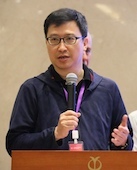Big Data lies at the center of modern science and technology, with major advances in analyzing & learning from Big Data concurrently reshaping human knowledge, society, and economy. The overwhelming amounts of data generated in many applications (fundamental sciences, cyber-physical systems, smart cities, sensor networks, and many more) alongside the urge for fast and effective handling and decision-making, in real-time, pose a number of significant challenges on the underlying system design and methods.
The 7th International Conference on Big Data Computing and Communications (BigCom2021), which is to be held on Aug. 13-15, 2021 in Deqing, China aims to address these challenges. The conference aims to attract researchers and practitioners with interest in the theme of Big Data, in its broadest sense: analytics, management, security and privacy, communications, and high-performance computing. We welcome original, unpublished research papers that emphasize theoretical foundations, modeling, algorithmic methodologies, and data-driven applications in science and engineering. We also welcome visionary papers on new and emerging topics.
The related topics include but are not limited to:
Computing
Data-intensive Parallel and Distributed Computing (Clouds, Clusters, Grids, P2P)
Performance Analysis of Big Data Tools and Applications
Computing on Network Edge
Large-scale Optimization Methods
Mining
Modeling and Algorithms for Big Data Analytics and Data Mining
Knowledge Mining from Big data
Network and Graph Mining
High Dimensional Data Mining
Security
Security and Legal Issue in Mobile Applications/Apps
Privacy of Open Data
Trust and Privacy Issues in Mobile Commerce Environment
Cryptographic Protocols
Networking
Artificial Intelligence & Internet of Things
Cyber-physical Systems
Wireless Networks
Multi-agent Systems
Management
Big Data Storage, Indexing, Searching and Querying
Big Data Quality Management
Heterogeneous Data Management
Database and Data Warehouse Technologies for Big data
Applications
Infrastructures and Frameworks of Data-driven Applications
Mobile Device Apps based on Big Data
Big Data for Healthcare
Big Data for Smart Cities
Important Dates
All deadlines are at 11:59 PM Pacific Standard Time.
First Round:
Paper submission: February 28, 2021 March 7, 2021
Author notification: March 25, 2021 March 31, 2021
Camera Ready: April 10, 2021 (Firm)
Second Round:
Paper submission: May 7, 2021
Author notification: June 4, 2021
Camera Ready: June 18, 2021
Conference dates: August 13-15, 2021
Paper Submission
Review policy: Authors may choose either to include or to exclude their identify in the submission. The program committee members are instructed not to disadvantage a submission either way.
Papers that do not adhere to the following guidelines will be rejected without review:
Submitted in PDF format
The page limits are 8 pages (including reference).
US letter-sized (8.5 inches x 11 inches) and two-Column format
Font size no smaller than 10 points
The conference proceedings will be published by Conference Publishing Services (CPS) and submitted for indexing by EI. Selected papers will be recommended to publish at SCI-indexed journals.
For details please check Submit.
Organizing Committee
General Co-Chairs:
Dan Wang, The Hong Kong Polytechnic University, Hong Kong
Wenyuan Xu, Zhejiang University, China
Yu Wang, Temple University, USA
TPC Co-Chairs:
Chenren Xu, Peking University, China
Dusan M. Stipanovic, University of Illinois at Urbana-Champaign, USA
Haisheng Tan, University of Science and Technology of China, China
General Co-Chairs
Yu Wang, Temple University, USA
Dan Wang, The Hong Kong Polytechnic University, Hong Kong
Wenyuan Xu, Zhejiang University, China
TPC Co-Chairs
Chenren Xu, Peking University, China
Dusan M. Stipanovic, University of Illinois at Urbana-Champaign, USA
Haisheng Tan, University of Science and Technology of China, China
Local Arrangement Chairs
Jun Yu, Hangzhou Dianzi University, China
Hailin Feng, Zhejiang A&F University, China
Yu Zhang, University of Science and Technology of China, China
Publicity Chairs
Liang Xiao, Xiamen University, China
Ruiting Zhou, Wuhan University, China
Jiahui Hou, University of Waterloo, Canada
Publication Chairs
Xin He, University of Science and Technology of China, China
Haohua Du, Beihang University, China
Poster Chairs
Bei Hua, University of Science and Technology of China, China
Hao Zhou, University of Science and Technology of China, China
Yubo Yan, University of Science and Technology of China, China
Industry Liaison Chairs
Panlong Yang, University of Science and Technology of China, China
Lufeng Mo, Zhejiang A&F University, China
Xi Wei, University of Science and Technology of China, China
Qiang Li, USTC-Deqing Alpha Innovation Institute, China
Finance and Registration Chairs
Ludi Xue, University of Science and Technology of China, China
Yanan Liu, University of Science and Technology of China, China
Xuerong Huang, University of Science and Technology of China, China
Web Chairs
Chen Gong, Peking University, China
Yang Zhang, University of Science and Technology of China, China
Program Committee
Kechao Cai, The Chinese University of Hong Kong, Hong Kong
Yue Cao, Wuhan University, China
Dongyao Chen, Shanghai Jiao Tong University, China
Haiming Chen, Ningbo University, China
Honglong Chen, China University of Petroleum (East China), China
Xinlei Chen, Tsinghua University, China
Xu Chen, Sun Yat-sen University, China
Yin Chen, Keio University, Japan
Siyao Cheng, Harbin Institute of Technology, China
Haipeng Dai, Nanjing University, China
Haohua Du, Beihang University, China
Guangsheng Feng, Harbin Engineering University, China
Shu Fu, Chongqing University, China
Ruipeng Gao, Beijing Jiaotong University, China
Zehua Guo, Beijing Institute of Technology, China
Zhenhua Han, Microsoft Research Asia, China
Jiahui Hou, University of Waterloo, Canada
Hong Huang, Huazhong University of Science and Technology, China
Jun Huang, Massachusetts Institute of Technology, USA
Qianyi Huang, Southern University of Science and Technology, China
Shaofeng Jiang, Aalto University, Finland
Lei Jiao, University of Oregon, USA
Haiming Jin, Shanghai Jiao Tong University, China
Linghe Kong, Shanghai Jiao Tong University, China
Hongyu Li, Rutgers University, USA
Jie Li, Northeastern University, China
Yupeng Li, Hong Kong Baptist University, Hong Kong
Feng Lin, Zhejiang University, China
Zhen Ling,Southeast University, China
Liang Liu, Beijing University of Posts and Telecommunications, China
Sicong Liu, Northwestern Polytechnical University, China
Tang Liu, Sichuan Normal University, China
Tong Liu, Shanghai University, China
Qian Ma, Sun Yat-sen University, China
Shijia Pan, University of California, Merced, USA
Hao Peng, Zhejiang Normal University, China
Yanghua Peng, ByteDance Inc., China
Xiaohui Peng, Institute of Computing Technology, Chinese Academy of Sciences, China
Zhuzhong Qian, Nanjing University, China
Geng Sun, Jilin University, China
En Wang, Jilin University, China
Jiangtao Wang, Coventry University, UK
Rui Wang, Southern University of Science and Technology, China
Tian Wang, Beijing Normal University-Hong Kong Baptist University United International College, China
Xiong Wang, Peking University, China
Zhiyuan Wang, The Chinese University of Hong Kong, Hong Kong
Zhenchun Wei, Hefei University of Technology, China
Wei Xi, Xi'an Jiaotong University, China
Xi Xiong, Google, USA
Mengwei Xu, Beijing University of Posts and Telecommunications, China
Yuedong Xu, Fudan University, China
Yanbing Yang, Sichuan University, China
Shichao Yue, Massachusetts Institute of Technology, USA
Jin Zhang, Southern University of Science and Technology, China
Jing Zhang, Xi’an University of Science and Technology, China
Lan Zhang, University of Science and Technology of China, China
Yong Zhang, Shenzhen Institute of Advanced Technology, China
Hao Zhou, University of Science and Technology of China, China
Pan Zhou, Huazhong University of Science and Technology, China



